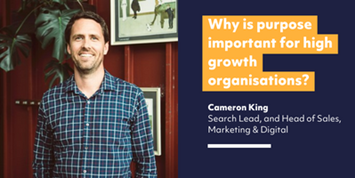Emotional Intelligence at work – what is it, why does it matter and how well do you understand yours? Tribe’s Jackie McCrindle talks us through it.
![]()
Emotional Intelligence…this is something that gets spoken about a lot these days, particularly in the recruitment and HR world. But is it just another buzzword? What does it mean and why is it important in the workplace?
Broadly speaking, Emotional Intelligence refers to an individual’s ability to manage their emotions and their core behavioural traits. Broken down further, it looks at intrapersonal intelligence - the ability to manage and understand your own thoughts, feelings and behaviours - and interpersonal intelligence - the ability to understand others and how best to relate to and engage with them.
When looked at from a business or workplace perspective, this can assist in predicting how a person may react and behave in certain situations and therefore help in predicting workplace performance. It can also be used as a self-development tool to strengthen your self-awareness.
Team Reboot founder, Brenda James, is a team and career development specialist who has a special interest in the subject of Emotional Business Intelligence. Brenda is a Certified Partner of EBW Global Business Emotional Intelligence and often, the work she does with teams and individuals starts with a full EBW assessment. EBW is an acronym for Emotions and Behaviours at work and the assessments can be used for several purposes – as a self-development tool for individuals, by hiring managers and/or people leaders when looking to develop or improve a team dynamic or to identify training gaps. It can also be used as part of the recruitment process to understand a potential candidate’s EI at work and what they may add to a team. Notice I said ‘add’ rather than ‘fit’ – this is important as it’s not about wanting to see a particular result or a ‘type’ of person but rather to better understand individuals and how their unique EI can contribute to the workplace.
Recently, I had the chance to take the EBW assessment offered by Team Reboot and sat down with Brenda to talk through the results.
So, what did this involve? Firstly, I worked through the online assessment, which took me around 15 minutes. Apparently, I was quite speedy! I put my speed down to wanting to go with my gut instinct and not overthink my answers, as well as the fact I was doing this at home during lockdown with my two young kids. Just under a week later, I met with Brenda over Zoom to go through the report with detailed feedback and discussion. This is a thorough process, we spent around 90 minutes together and could have spent longer if time allowed. Brenda then followed this up with an individualised written report.
The initial assessment and accompanying results are broken down into the following ‘clusters’, which then provide you with an understanding of your Emotional Business Intelligence: Decisiveness, Motivation, Influence, Adaptability, Empathy, Conscientiousness, Stress Resilience.

How did I find the results? Some of it was surprising initially, however once I listened and reflected on the feedback, I found it fairly (scarily) accurate. What was also interesting to note was how I have changed over the years. Some of the aspects of my character that I perceived as strengths earlier in my career didn’t show up quite as strongly now (Motivation and Influence). However, some of the areas that I am stronger in now have been developed through maturity and life experiences (Empathy and Resilience).
What I also found interesting was that while some results could be perceived as negative, they were often offset by strengths in other areas. Together they produced a similar result to what a stronger score in individual areas would have. For example, my motivational score was slightly lower than I expected whereas my conscientiousness and resilience were higher. While I may come across as someone who is perhaps a bit cautious and less enthusiastic than others at times, my conscientiousness and resilience reflect that I am driven to complete tasks, I can work through setbacks and I don’t want to let people around me down.
I have found this process really valuable. EI in the workplace has a massive impact on not only yourself but those around you and indeed the success of your business goals. There were certainly some areas where I found the results confronting. For a moment, it felt a little jarring to think a trait I have previously prided myself on may no longer be so prominent. However, having the opportunity to identify this and to reflect on why that may be, I now have the chance to make some changes and push myself more for my own benefit, as well as the people I work with. Additionally, having my strengths highlighted for me in black and white has given me food for thought on where I could be focusing more of my time to achieve better success and deeper satisfaction in my work.
Overall, I think that having strong self-awareness is the first step in protecting your strengths and bolstering your weaknesses. I would not hesitate in recommending people take the time to look at their own Emotional Intelligence and how it impacts themselves and those around them. After all, what gets measured gets improved.
Huge thanks to Brenda at Team Reboot for the chance to work though the assessment and for the warm and insightful way the feedback was provided. I think this experience will continue to have a positive impact for some time to come.





